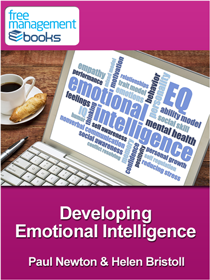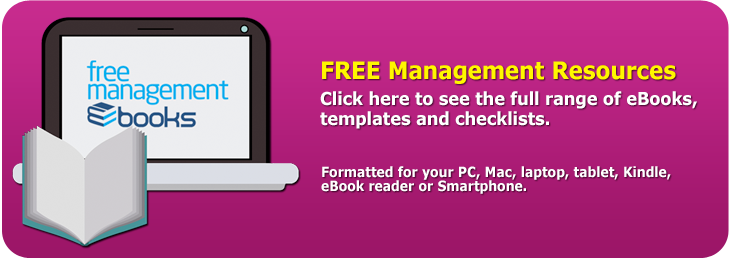Developing Emotional Intelligence - Free eBook in PDF Format
 |
 |
|
Book Description - ISBN 978-1-62620-969-5 (57 Pages)
This free eBook explains how to develop your personal and social competencies using the reflective cycle technique. This simple six-stage process can help you to develop your emotional intelligence and become a more effective manager. The most important part of becoming a leader in the modern workplace is to be the person that others choose to follow. By taking the time to develop your own EQ you can implement changes and manage conflict far more effectively than by simply compelling people to follow your instructions.
Chapter 1 - Developing Emotional Intelligence
You must be willing to examine your own behavior honestly and objectively if you want to increase your own EQ. The four competencies that make up EQ are: Self-awareness, Self -management, Social Awareness, and Relationship Management. The reflective cycle technique is a six-stage process that can help you to develop your EQ.
Chapter 2 - Emotional Intelligence and Self-Awareness
Personal competence is made up of self-awareness and self-management. Self-awareness is all about recognizing and understanding how your own emotions affect your interactions with others. By using techniques to develop your EQ self-awareness you will be able to openly address such behaviors and their underlying emotions. It is only by being aware of your own emotions and the impact they can have that you can hope to address them.
Chapter 3 - Emotional Intelligence and Self-Management
Self-management builds on the basis of self-awareness and is the ability to control your emotions so that they don't control you. Self-management is critical for a manager because no one wants to work for someone who is not in control of themselves. Making an honest assessment of your own behavior will enable you to identify and address problem areas before they become damaging.
Chapter 4 - Emotional Intelligence and Social Awareness
Social competence consists of social awareness and relationship management. Social awareness allows you to accurately read situations and people because you are able to understand and empathize with their emotions. Confusion and conflict can be reduced or eliminated by simply taking the time to understand someone else's point of view before trying to persuade them to change it. Active listening will ensure that you hear exactly what the other individual has said, and that they know that you have heard it. Organizational awareness is your ability to understand the key power relationships, values, and culture of the organization. You need to fully understand an organization in terms of what it states to be its values and culture and by observing how these translate into operational actions.
Chapter 5 - Emotional Intelligence and Relationship Management
Relationship Management includes the identification, analysis, and management of relationships with people inside and outside of your team. It is the aspect of your EQ that enables you to succeed in inspiring other people and helping them to reach their full potential. The competencies associated with relationship management include: influence, leadership, communication, conflict management, teamwork, and collaboration.
Chapter 6 - Emotional Intelligence, Communication, and Coaching
People will be much easier to persuade to adopt your point of view if they believe that you have their interests at heart. Well-planned communications can help you to set the appropriate emotional tone. Poorly executed communications can trigger negative emotions, causing you unnecessary hassle.
Chapter 7 - Emotional Intelligence, Change, Conflict, and Leadership
Successful managers are forward-thinking and open to change. The ability to recognize conflict and to take action to resolve it as soon as possible is an essential skill. The Blake and Mouton model can help you to understand conflict. Conflicts involve feelings and these need to be understood and managed.
| You will learn: |
|
Emotional Intelligence in the Workplace - To develop your emotional intelligence in the workplace you must be willing to openly and honestly reflect on your own performance and behavior. Your long-term success relies on you making this an iterative process throughout your career.
Avoiding Stress at Work - Everyone has their unique level of over-commitment that leads to stress at work. Knowing when you are approaching this level and taking positive steps to keep control are key to maintaining your performance and productivity. You need to be aware of your stress symptoms.

